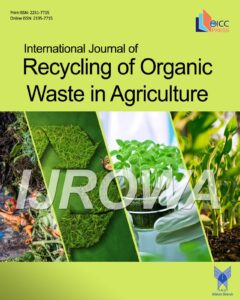The effect of compost on growth and yield of Phaseolus vulgaris plants grown under saline soil
Authors
Abstract
Purpose The effect of a novel organo-mineral fertilizer (OMF) compost, as a partial alternative to mineral fertilizers, on soil characteristics, growth, physio-biochemical attributes, Cd2? and NO3 – concentrations, and yields of Phaseolus vulgaris L. plants grown under salt stress was investigated. Methods Six organic and mineral materials were well mixed with water and composted in a polyvinyl house in a concrete trench of size 4 9 5 9 2m (W 9 L 9 D), respectively. The moisture content was maintained at 50–60% throughout the active composting period by frequent checking. The mixture was turned at 7-day intervals for about 2 months to maintain porosity. This OMF compost was applied for the tested saline soil at 10, 20 and 30 ton ha-1 while reducing the recommended NPK to 50%. In addition,100% NPK was applied as a control to achieve the purpose of this study. Growth characteristics, quantitative and qualitative yield, Cd2? and NO3 – concentrations, and physio-biochemical attributes in common bean plants were assessed. Results Addition of OMF compost improved the soil chemical and physical properties. Application of OMF compost at a rate of 20 ton h-1 , as an alternative to 50% of the recommended dose of mineral-NPK fertilizers, significantly decreased the concentrations of Cd2? and NO3 – in plant leaves, pods and seeds, showing the same growth characteristics, and pod and seed yields compared to the control (100% of mineral-NPK fertilizers). This treatment also improved all determined physio-biochemical attributes and tested soil characteristics compared to the control. Conclusion The benefit of this OMF compost, as a partial alternative to chemical fertilizers, demonstrated the validity and possibility of sustainable agronomic performance of common bean using locally available recycled organic materials for manufacturing the studied OMF.



